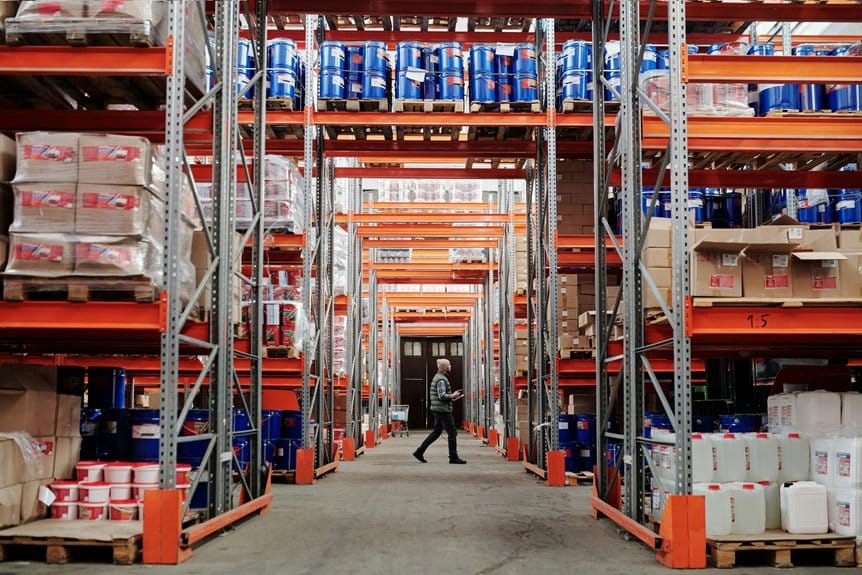Blockchain technology is transforming supply chain management through decentralized, immutable digital ledgers that enhance transparency and security. Major corporations like Walmart and Maersk have achieved significant improvements, with tracking times reduced from days to seconds and connection of over 150 organizations handling millions of weekly events. The technology enables real-time monitoring, automated smart contracts, and end-to-end traceability while reducing costs by eliminating intermediaries. With the market projected to reach $3.3 billion by 2023, organizations report 20-30% improvements in traceability and 85% reductions in counterfeit products. Understanding the technical considerations and implementation best practices reveals the full potential of this revolutionary technology.
Understanding Blockchain Supply Chain Fundamentals
Through the integration of blockchain technology, supply chain management has undergone a transformative evolution in recent years. The fundamental blockchain basics establish an immutable digital ledger that records transactions and interactions across the entire supply chain network. This decentralized system creates a secure, transparent framework for tracking goods, services, and information flow.
Supply chain integration with blockchain technology relies on transparency mechanisms that enable real-time monitoring and verification of transactions. Data immutability ensures that once information is recorded, it cannot be altered or tampered with, establishing trust among participating entities.
Smart contracts automate and enforce predefined rules, reducing manual intervention and potential errors in supply chain operations.
Traceability solutions powered by blockchain provide end-to-end visibility of products from origin to destination. This enhanced transparency allows stakeholders to verify authenticity, monitor compliance, and respond swiftly to disruptions.
Stakeholder collaboration is facilitated through shared access to verified data, enabling better decision-making and risk management. The decentralized nature of blockchain eliminates single points of failure and reduces dependency on intermediaries, creating a more resilient and efficient supply chain ecosystem.
Key Benefits for Business Operations
Implementing blockchain technology in supply chain operations yields multiple tangible benefits for businesses across diverse industries. Through decentralized ledger systems, organizations achieve significant cost reduction by eliminating intermediaries and streamlining documentation processes.
The technology enables transparency enhancement across the entire supply chain, allowing real-time visibility of transactions and movement of goods.
Fraud prevention represents another crucial advantage, as blockchain's immutable nature makes it nearly impossible to alter records without detection. The technology revolutionizes inventory management by providing accurate, real-time tracking of stock levels and movement.
Traceability improvement enables companies to track products from origin to destination, ensuring authenticity and quality control throughout the supply chain journey.
Enhanced stakeholder collaboration occurs through shared access to verified data, fostering trust and enabling faster decision-making.
Blockchain also ensures compliance assurance by maintaining comprehensive audit trails and automatically enforcing regulatory requirements. The technology's inherent data integrity guarantees that all supply chain information remains secure, unaltered, and accessible to authorized parties, creating a single source of truth for all stakeholders involved in the supply chain ecosystem.
Real-World Implementation Success Stories
Several major corporations have successfully deployed blockchain solutions in their supply chains, demonstrating the technology's practical value and scalability.
Walmart's food safety initiative with IBM's Food Trust platform achieved enhanced collaboration among suppliers and real-time tracking of produce from farm to store. The system reduced trace time for mangoes from 7 days to 2.2 seconds, significantly improving food safety responses.
Maersk and IBM's TradeLens platform exemplifies blockchain transparency in global shipping, connecting over 150 organizations and handling 10 million shipping events weekly. The solution delivered substantial cost reduction through digitized documentation and improved supplier verification processes.
De Beers implemented TRACR, a blockchain platform ensuring diamond traceability benefits and fraud prevention across the mining-to-retail pipeline.
BMW's PartChain initiative demonstrated robust data security while tracking automotive components across 15 plants and multiple suppliers. Their implementation reduced counterfeit parts by 85% and improved supply authentication.
Nestlé's OpenSC platform enabled consumer-facing transparency for coffee and palm oil sourcing, resulting in 30% increased customer trust and strengthened supplier compliance through immutable record-keeping.
Technology Challenges and Solutions
Despite blockchain's proven benefits, organizations face significant technical hurdles when integrating the technology into existing supply chain systems. The primary challenges include scalability issues, which can limit transaction processing speeds, and data privacy concerns that arise when sharing sensitive information across multiple parties in the supply chain network.
To address these challenges, developers have implemented several technical solutions. Layer-2 scaling protocols and sidechains help manage transaction volumes more efficiently, while zero-knowledge proofs and private channels enable secure data sharing without compromising confidentiality.
Organizations are also adopting hybrid blockchain architectures that combine private and public networks to optimize performance and security. Enterprise-grade platforms now incorporate advanced cryptographic techniques and permissioned networks to ensure data privacy while maintaining transparency where needed.
Smart contract automation has been enhanced with improved verification methods and fail-safes to prevent errors in execution. Additionally, interoperability protocols are being developed to enable seamless communication between different blockchain networks, allowing organizations to maintain their existing systems while gradually transitioning to blockchain-based solutions.
These technological advancements continue to make blockchain implementation more viable for supply chain operations.
Market Leaders and Industry Adoption
Major corporations and technology providers have emerged as pioneers in blockchain-based supply chain solutions, with IBM, Microsoft, and Oracle leading the enterprise market. These market leaders have developed comprehensive platforms that enable end-to-end supply chain visibility, with IBM's Food Trust and TradeLens platforms demonstrating significant industry adoption across food safety and shipping sectors.
Integration strategies focus on scalable solutions that address existing infrastructure limitations while maintaining compliance with the evolving regulatory landscape.
Collaboration models between technology providers and industry participants have proven crucial for widespread implementation. Walmart, Maersk, and Nestlé have partnered with blockchain solution providers to establish transparency initiatives that enhance consumer trust and operational efficiency.
These early adopters have reported 20-30% improvements in supply chain traceability and significant reductions in documentation processing time.
The competitive advantage gained through blockchain adoption has driven increased interest from mid-sized enterprises, particularly in pharmaceuticals, luxury goods, and agriculture.
Industry analysts project the blockchain supply chain market to reach $3.3 billion by 2023, with Asia-Pacific regions showing the fastest adoption rates.
Success in implementation largely depends on standardized protocols and interoperability between different blockchain platforms.
Future Trends and Opportunities
Through extensive market analysis and technological forecasting, emerging trends in blockchain supply chain solutions point toward advanced integration with artificial intelligence, IoT devices, and smart contracts. This convergence enables decentralized logistics systems that optimize resource allocation while maintaining data integrity across global networks.
Industry projections indicate significant growth in transparent tracking implementations, with an estimated 65% of enterprises planning to integrate blockchain-based supply chain solutions by 2025. Smart contracts are revolutionizing cross-border transactions by automating compliance procedures and reducing processing times from days to minutes.
These developments facilitate enhanced stakeholder collaboration through real-time data sharing and verification protocols. Sustainability initiatives are becoming increasingly central to blockchain supply chain strategies, with companies leveraging distributed ledger technology to verify environmental compliance and ethical sourcing.
The integration of regulatory compliance frameworks within blockchain platforms is streamlining audit processes and reducing documentation overhead. As the technology matures, organizations are positioning themselves to capitalize on improved visibility, reduced operational costs, and enhanced security measures through blockchain-enabled supply chain transformation.
Best Practices for Getting Started
Organizations seeking to implement blockchain supply chain solutions must begin with a structured roadmap that addresses key foundational elements. The first step involves conducting an initial assessment to identify specific pain points, technical requirements, and potential integration challenges within existing systems. This evaluation should encompass current processes, data flows, and technological infrastructure.
Successful implementation requires comprehensive stakeholder engagement across departments and external partners. Companies must establish clear governance structures, define roles and responsibilities, and ensure buy-in from all participants.
Starting with a small-scale pilot project allows organizations to test assumptions, validate benefits, and identify potential obstacles before full-scale deployment.
Technical considerations should include selecting appropriate blockchain platforms, establishing consensus mechanisms, and defining data standards. Organizations must also develop robust security protocols and ensure compliance with relevant regulations.
Creating detailed documentation and training programs helps facilitate smooth adoption and maintains operational consistency. Regular assessment of key performance indicators enables organizations to measure success and make necessary adjustments throughout the implementation process.
Frequently Asked Questions
How Much Electricity Does a Blockchain Supply Chain System Typically Consume?
Blockchain supply chain systems' electricity consumption varies greatly, but modern solutions prioritize energy efficiency through proof-of-stake protocols, consuming 99% less power while maintaining network sustainability compared to traditional systems.
Can Blockchain Supply Chains Work Effectively in Regions With Limited Internet Connectivity?
Blockchain supply chains can operate in low-connectivity areas through offline transaction capabilities and periodic data synchronization when connections are available, though performance may be slightly reduced compared to fully-connected implementations.
What Happens to Supply Chain Data if a Participating Company Goes Bankrupt?
Blockchain preserves data integrity even after bankruptcy, as records remain immutable and distributed across the network. Company liabilities and transaction histories stay permanent, ensuring supply chain transparency despite organizational changes.
How Are Disputes Between Supply Chain Partners Resolved in Blockchain Systems?
Disputes are managed through smart contracts with predefined resolution protocols, consensus mechanisms, and mediation processes. Stakeholder engagement and transparency benefits support trust building while adhering to established legal frameworks.
Are Blockchain Supply Chain Solutions Compatible With Legacy Barcode Scanning Systems?
Blockchain solutions can integrate with legacy barcode systems through middleware and API connectors, though integration challenges exist. Modern scanning hardware enables seamless data transfer between legacy systems and blockchain networks.
Conclusion
Blockchain supply chain solutions represent a transformative force in modern business operations, delivering enhanced transparency, security, and efficiency. As adoption rates continue to climb and technological barriers diminish, organizations implementing these systems report significant improvements in traceability, cost reduction, and risk management. The integration of blockchain with IoT, AI, and other emerging technologies points to an increasingly interconnected, automated future for supply chain management across global industries.





